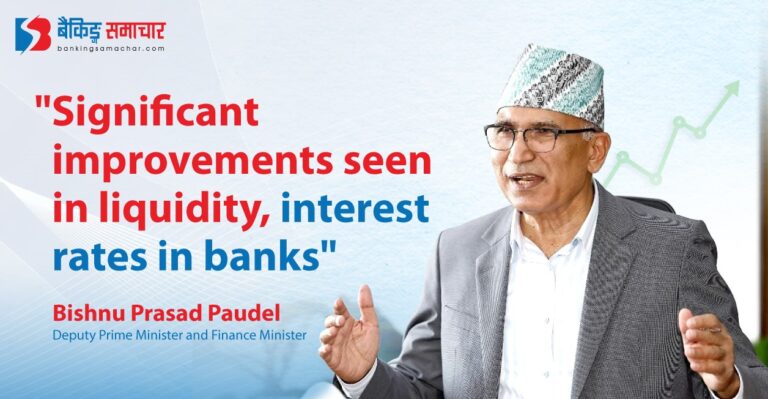Kathmandu — Bishnu Prasad Paudel, Vice Chairman of CPN-UML, currently serves as the Deputy Prime Minister and Finance Minister of Nepal. Amid the global economic downturn triggered by the COVID-19 pandemic and the Russia-Ukraine war, Nepal also faced economic challenges. Minister Paudel took charge of the Finance Ministry during this critical time.
With signs of recovery emerging in Nepal’s economy, the Finance Minister recently shared his progress over the past four months and addressed topics ranging from economic reforms to internal politics in an exclusive interview with Rastriya Samachar Samiti (RSS). Below are highlights from the conversation:
Efforts to Revitalize the Economy
Since assuming office, we have focused on analyzing the country’s overall economic situation, identifying problems, and implementing solutions. As a result, signs of improvement are visible. The private sector’s confidence has grown, and the investment climate is improving. Upon taking office, we devised a 100-day action plan, over 90% of which has been implemented.
Key initiatives include forming a high-level Economic Sector Reform Commission with representatives from experts and private sector organizations. We have also enacted critical policies, including new rules for insurance, securities issuance, customs, internal revenue mobilization, and debt management.
Notably, the 10% Value-Added Tax (VAT) paid by consumers on digital payments is now being refunded to their bank accounts. Additionally, technological enhancements, such as vehicle scanners at Tatopani customs and SMS/email notifications for customs declarations, have been implemented. Savings bonds and foreign employment savings bonds have also been dematerialized (demat).
Challenges in Spending and Revenue Collection
When we assumed office, the government was burdened with unsettled liabilities from the previous fiscal year. The Finance Ministry has facilitated payments gradually while ensuring legal compliance. Foreign reserves, remittance inflows, and the balance of payments have improved significantly. Liquidity in banks has increased, and interest rates have become more favorable.
Capital market activity has revived, and improvements in capital expenditure are evident, with an increase of NPR 4 billion compared to the same period last year. Revenue collection has also surged by 17% in the first four months of the fiscal year.
Restoring Economic Growth
The World Bank has projected Nepal’s economic growth to rebound to 5.1% this year, up from 3.9% last year. Additionally, Nepal is on track to graduate from the Least Developed Country (LDC) status to a developing nation by 2026. For the first time, Nepal secured a ‘Double B Minus’ sovereign credit rating from Fitch Ratings, positioning Nepal second in South Asia after India.
Addressing Concerns from the Private Sector
While challenges persist, significant groundwork has been laid. Confidence in the private sector and other economic areas is growing. However, we must channel affordable credit and liquidity into production, employment generation, and income growth. We aim to engage citizens in employment and self-employment opportunities, addressing broader economic demands.
On Political Alliances and Stability
Nepal’s citizens yearn for stability and prosperity. The coalition government formed with Nepali Congress and CPN-UML is a strategic choice for political stability and effective governance. Despite external attempts to disrupt this alliance, we remain committed to sustaining the partnership until the 2084 general elections, ensuring progress and stability.
Minister Paudel expressed optimism about the economy’s direction and reiterated his commitment to driving reforms and fostering a collaborative political environment.
4o



 About Us
About Us
Comment